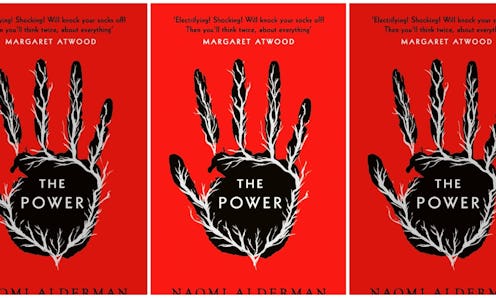Books
The Power' Is The 2017 Version Of 'The Handmaid's Tale' That Every Woman Needs To Read

Naomi Alderman’s feminist sci-fi novel The Power, out Oct. 10 in the U.S., has already been making waves over in the UK since it was released last year, and it’s now about to empower women on this side of the Atlantic too. The Power is about what would happen if women suddenly gained the power to cause immense pain through their fingertips. By casting electric shocks out of their hands, women become more powerful than men, and all of a sudden, the tables are turned.
It's not farfetched to say that The Power is 2017’s answer to The Handmaid’s Tale; in fact, Naomi Alderman was even mentored by Margaret Atwood while she was writing it. So if you raced through every heart-wrenching episode of the Hulu The Handmaid’s Tale adaptation and are now craving more, The Power is exactly the book you need to pick up next.
Unlike Atwood’s classic novel, which takes the oppression of women to dire extremes, The Power flips this oppression on its head, and explores what might happen if women took the lead. Where The Handmaid’s Tale might have left you feeling hopeless, The Power will give you a glimpse of what it must feel like to be in control. The novel’s framing device imagines a matriarchal world thousands of years in the future, in which a male writer is struggling to pitch a novel to his rather patronizing (or should I say matronizing?) female editor. It’s a humorous opening to an otherwise much grittier novel; female readers can’t help but laugh seeing the editor talk down to the writer in exactly the same way we have all experienced from men over and over again. But while it’s tempting to take joy in this role reversal, The Power goes on to show exactly how brutal a matriarchy would really be in the making.
The Power by Naomi Alderman, $18, Amazon
Throughout the novel, Naomi Alderman challenges the stereotype we have so often heard repeated: that a world run by women would be kinder or gentler than a male-dominated one. In Alderman’s vision, physically powerful women act exactly as men have throughout history — gaining control through the violence and force that now comes easily to them. But by the novel’s end, none of the central female characters are any happier than they were at the novel’s start. Just as the current patriarchy causes harm to the very men that it benefits, Alderman’s imagined matriarchy does not paint a desirable picture for women. No matter which gender allows physical strength and an imagined biological determinism to justify the power they feel entitled to, the consequences are just as dire.
When The Handmaid’s Tale was first released in 1984, it shone a revolutionary light on the way that women’s bodies are treated as state property, and a warning of what might be to come. The Hulu adaptation was so terrifying in 2017 because we are now well on the way to living in the dystopian world it describes. Now, Alderman’s novel shines a light even further forward, predicting the violence to come in our future if we continue to allow any gender to rule over and oppress any other.